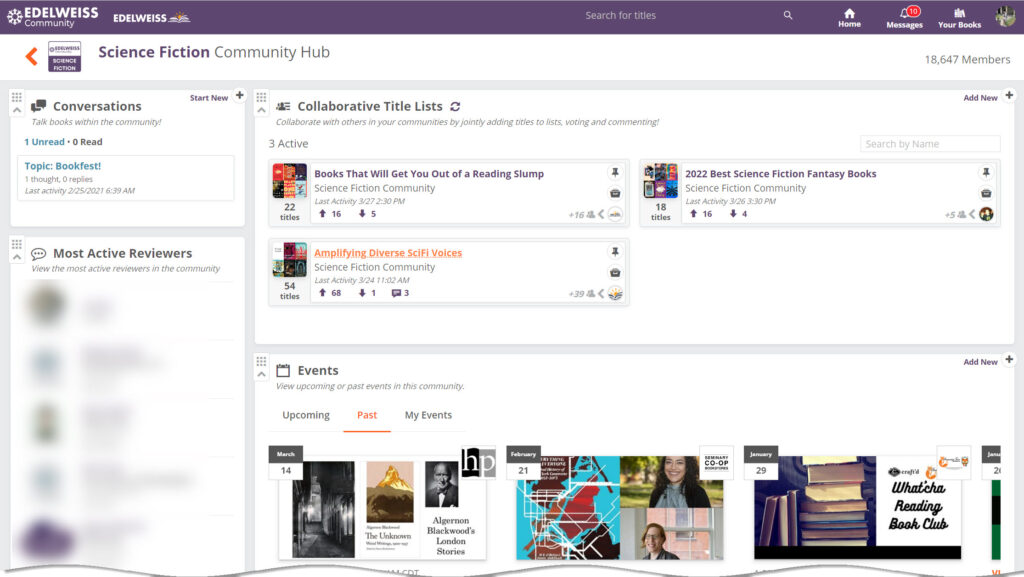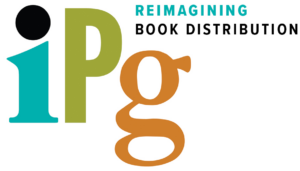
Within the Edelweiss suite of products, Edelweiss Community is designed to make conversation and collaboration on books easy and intuitive. The mobile-friendly platform includes the ability for users to join and create communities of their peers or like-minded readers—within which members can talk with one another and work together on lists of books.
We spoke with one of the publisher organizations that has adopted Community as part of their workflow, the distributor Independent Publishers Group (IPG). They share how the site has made it simpler than ever to work together and how they employ Collaborative Lists to cut down on meetings and stay organized.
 In 2020, we soft-launched Edelweiss Community, a new site in the Edelweiss suite that promised a simpler, mobile interface for book lovers to connect with one another. Community retained many of the features familiar to users of Edelweiss (options to download review copies, shelve titles, and leave reviews), but it also added the ability for users to join and create communities—groups of their professional peers or like-minded readers.
In 2020, we soft-launched Edelweiss Community, a new site in the Edelweiss suite that promised a simpler, mobile interface for book lovers to connect with one another. Community retained many of the features familiar to users of Edelweiss (options to download review copies, shelve titles, and leave reviews), but it also added the ability for users to join and create communities—groups of their professional peers or like-minded readers.
The site was designed so that, within an individual community, members would have additional tools for communication and collaboration. Most notably, Community added Collaborative Lists, which enable members of a community to work together to build and rank a list of titles on a chosen topic or theme. Once a community member creates a list, it is easy for other members to add books to it or to vote on the titles that it includes. Members also have the option to comment on titles and have conversations with one another.
 A few years later, Community is out of beta and its users have created a diverse range of communities and Collaborative Lists. The Cooking Community has been working on “Show Me the Veggies,” “My Memoir Stack Keeps Growing” keeps growing in the Biography/Memoir Community, and the Science Fiction Community has identified quite a few “Books That Will Get You Out of a Reading Slump.”
A few years later, Community is out of beta and its users have created a diverse range of communities and Collaborative Lists. The Cooking Community has been working on “Show Me the Veggies,” “My Memoir Stack Keeps Growing” keeps growing in the Biography/Memoir Community, and the Science Fiction Community has identified quite a few “Books That Will Get You Out of a Reading Slump.”
 And, publishers and distributors on Edelweiss have also gotten in on the list-making action. In particular, Independent Publishers Group (IPG), a distributor for client publishers both in the United States and worldwide, has turned to Community to support their Top Shelf program, a seasonal list of top picks selected from their frontlist of independent titles and promoted to buyers.
And, publishers and distributors on Edelweiss have also gotten in on the list-making action. In particular, Independent Publishers Group (IPG), a distributor for client publishers both in the United States and worldwide, has turned to Community to support their Top Shelf program, a seasonal list of top picks selected from their frontlist of independent titles and promoted to buyers.
“With our Top Shelf program, we wanted to figure out a way to focus our sales, marketing, and publicity efforts for a few titles that could benefit from a little extra push behind them,” says Lauren Klouda, Director of Marketing at IPG.
“Identifying these Top Shelf titles is intended to help librarians and booksellers—we know there is only so much space on their shelves. These are the stars of each season’s list [that they should not miss.]”
Top Shelf titles are designated through consensus by IPG’s Top Shelf Steering Committee, with members of the sales, marketing, and publicity teams working together to pinpoint which titles they feel have the strongest, broadest chance to do well in their markets or which have generated lots of excitement among the team.
Before Community, the process of identifying books for the Top Shelf program was a long and laborious one that involved spreadsheets and many meetings to track and manage multiple rounds of voting.
“We're very selective, and we have to cull our list from 1,500 to 2,000 titles for the season down to just 25 books,” says Lauren. “And, what we were doing before Community was having meeting after meeting with spreadsheet after spreadsheet—and these meetings were hours long each.”
With Community, however, IPG has been able to shed the spreadsheets and meetings in favor of collaborating and voting online. Following an initial ranking of excitement around titles, which takes place at their sales conference, the Top Shelf Committee adds the top 150 or so titles for the season to a collaborative list within an IPG Community private to IPG staff. Then, voting begins.
“Everyone on the Top Shelf Committee goes into the list, leaves comments on titles, and upvotes their picks,” says Travis Hale, Sales Coordinator at IPG. “Books that have an average of five or more up votes will advance for us to discuss.”
And, with much of the labor of culling the initial list taking place online in Community, IPG has found that their discussions of the top contenders for the Top Shelf program are far more streamlined and productive.
"Before, our Top Shelf meetings were like having sales conference again because there were just so many titles to talk about. There would be books that we knew weren’t quite the right fit for the Top Shelf program—and that will find their audience through our other sales efforts—but which we would still discuss the merits of because they were on the list for consideration,” says Travis.
In addition, while the main Edelweiss site is layered with many professional features and tools to support B2B workflows, Community emphasizes a streamlined, ease of navigation so engaging in this type of collaboration is simple for anyone to pick up.
“The fact that Community is pared down makes it super intuitive,” says Lauren. “In our Top Shelf Steering Committee, we’ve had users with varying degrees of familiarity with Edelweiss just in general, and I don't think there was anybody asked, ‘Wait, what do I do?’ It was just there.”
“Community has been such a great time saver that has cut down on hours and hours of meetings because the expectation is this is a list. Just go and upvote what you like,” says Travis.
And, the IPG team is already thinking of other ways to use Community to support their collaborative processes.
“We’re definitely looking into more applications for the site,” says Lauren. “We essentially see it as a collaborative catalog—it is a shared, real-time way of getting a sense of what everybody's doing and what everybody's really excited about.”
Among these are plans to develop internal thematic collaborative lists in the IPG Community to which folks can add their picks, such as Pride lists, Debut lists, AAPI lists, and many others.
The tools on Community are designed to give users the flexibility to tackle a wide range of different projects. In addition to IPG’s use of internal communities, on Edelweiss Community publishers and distributors can set up public facing communities to highlight collaborative lists. They can also post their events to Community for free, join communities of interest to monitor buzz around their titles, and auto-approve communities for access to their DRCs.
“It is exciting to see the different ways that publishers and distributors have used Community so far,” says Alison Langlois, Edelweiss Senior Client Success Manager for publishers. “We are continuing to develop and improve the site based on user needs and feedback, so we highly encourage everyone to explore it and let us know what you think.”
Interested in learning more about Edelweiss Community? Find information on the platform and its features here.

